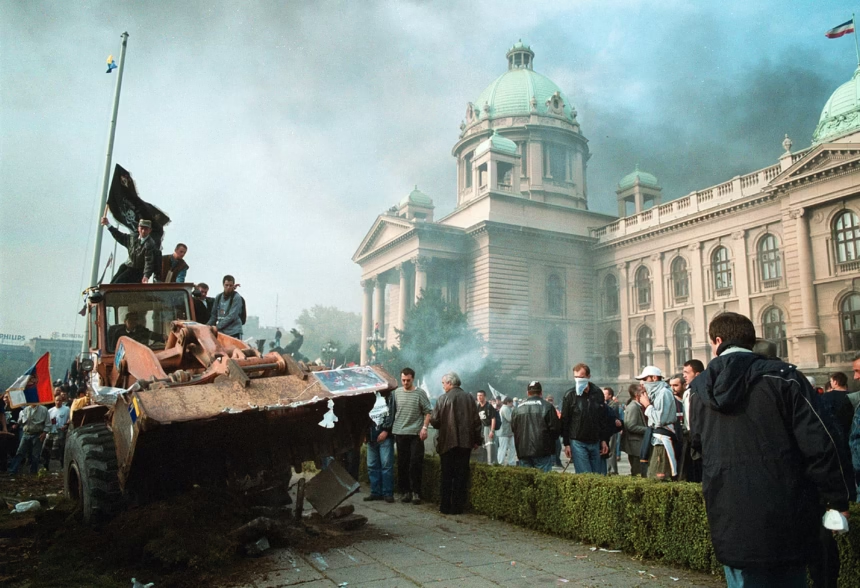The Swiss daily Neue Zürcher Zeitung (NZZ) marked the 25th anniversary of the October 5, 2000 protests that ended the rule of Slobodan Milošević, Serbia’s long-time president and former leader of Yugoslavia. In two detailed features, the paper recalls the mass demonstrations that toppled his authoritarian regime and examines Serbia’s political trajectory since then.
In its first feature, titled “Slobodan Milošević: The man who wanted to make Serbia great and ultimately destroyed Yugoslavia,” NZZ published a large-format photo chronicle covering Milošević’s political rise in the late 1980s, his alliance with Bosnian Serb leader Radovan Karadžić, the Dayton Peace Accords, his 1998 meeting with Ibrahim Rugova, the mass protests of October 5, 2000, his arrest and extradition to The Hague, and finally his grave in Požarevac.
The paper notes that while Milošević today has only a small number of supporters, the idea of a “Serbian World” — the unification of all Serbs into one state — has outlived him and remains present in parts of Serbian society.
In its second feature, “25 Years Ago Milošević Was Overthrown – The Uprising Was Only a Halfway New Beginning,” NZZ argues that while Milošević was the main culprit behind the Yugoslav wars, he was not a true nationalist but rather a cynical man of power who used nationalism as a tool to mobilize people and consolidate control.
NZZ recalls that Milošević abolished Kosovo’s autonomy in 1989, framing Kosovo Serbs as an oppressed minority, and turned the narrative of Serb victimhood into a state project. The daily describes him as not classically charismatic, but effective in projecting competence and pragmatism, able to present himself as a nationalist, communist, or statesman depending on the moment.
The paper stresses Milošević’s pragmatism, from his 1992 negotiations with Croatian President Franjo Tuđman over Bosnia, to his later distancing from Karadžić and Ratko Mladić under international pressure. Similarly, the West alternated between viewing him as the source of evil and a negotiating partner.
After the 1999 NATO bombing, Serbia’s fragmented opposition united and defeated him in the 2000 elections, but when Milošević tried to steal victory, the October 5 uprising erupted. NZZ points out that security structures — the “deep state” of secret services and paramilitaries — allowed his fall to protect their survival, making the change only a partial break with the past.
The 2003 assassination of reformist Prime Minister Zoran Đinđić shattered hopes for a full democratic transition, leaving Serbia in the hands of what NZZ calls “mediocre leaders” for a decade. In 2012, Aleksandar Vučić, Milošević’s former information minister, rose to power with the Serbian Progressive Party (SNS), which consolidated control over institutions and the media, making his rule appear untouchable for years.
However, NZZ underlines that in the past year student and civic movements have challenged Vučić’s authority, demanding power-sharing, new elections, and genuine democracy.
The paper concludes: “After October 5, Serbia may now need an October 6.”







